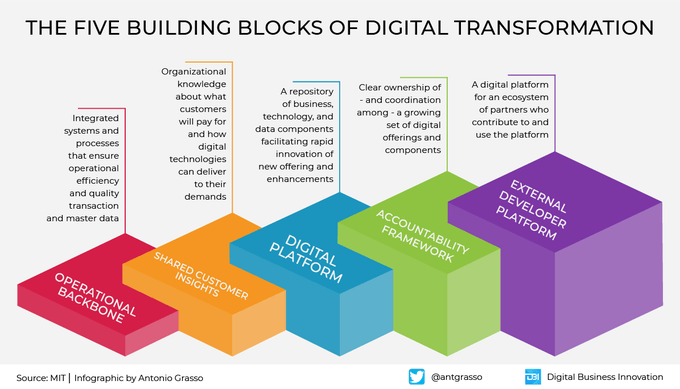It goes without saying that running a business happens to be a difficult endeavour for entrepreneurs to undertake. A variety of elements, both large and bite-sized, have the potential to have a significant influence on a company’s present and future. To make the most of the scenario, an entrepreneur must be watchful of all trends and incorporate them into his or her firm regularly.
Recent years have witnessed rapid advancements in technology and digitalisation, which have only been accelerated by the current epidemic and the mobility limitations that it has imposed. While technological advancements have an almost equal impact on all businesses in each industry, the resources available across businesses to cope with technological change are not the same. Whenever it involves large-scale industry transitions, small and medium-sized firms, in particular, sometimes face a shortage of financial resources.
What is a Digital Transformation Strategy?
A digital transformation plan is the strategy for transforming the business using digital technology across relevant facets to accomplish a variety of goals, including increased efficiency and cooperation as well as faster delivery and more customer satisfaction.
Scope of Digital Transformation
In the simplest of terms, digital transformation refers to the incorporation of technology within the day-to-day operations of an organisation. This may be accomplished in a variety of ways, with the method chosen primarily determined by the characteristics of the firm.
Why Does Your Business Need Digital Transformation:
Let us now discuss why your business must go for digital transformation to understand how it can make a difference to your business.
- Changing the Customer Experience
Customer experience is the driving force behind digital. 92% of business executives are developing innovative digital transformation plans to analyse customer expectations and enhance the customer experience to make them customers for life.
- Better Insights Backed by Data
Monitoring and analysis of metrics are made possible by going digital. Making better decisions and increasing ROI may both be accomplished by using data-driven insights to better understand consumers and re-evaluate company strategy.
- Increased Innovation and Flexibility
Digital transformation drives business growth with next-gen innovation and provides you and your consumers a flexibility of options to choose from. 68% of businesses rank agility as one of the top three goals for digital transformation efforts.
- Stay Ahead of Your Competitors
By developing new goods and services, entering new markets, and enhancing customer comprehension and service, digitisation allows businesses to gain an edge over their competitors. It also assists businesses in generating fresh sources of income by offering cutting-edge technologically enabled goods and services.
- Easy Cross-functional Collaboration
By establishing the organisation on digital congruence, digital transformation gives a fantastic chance for cohesion and collaboration throughout the company. When everyone is working towards the same goals, the shift will go smoothly and seamlessly.
The Need for Digitisation in SMBs
Numerous studies and statistical information supporting business digitalisation have recently come to light. According to IDC’s research, SMBs who adapt to the current digital needs produce up to 50% more sales and exhibit increased efficiency, while those who are at the forefront have doubled their advantages.
This is due to the fact that in modern times, individuals have developed a preference for operating media that are quick and effective. With an increasing focus on providing customer-centric services, businesses may forge relationships with their clients and boost client loyalty. Technology, such as cloud tools, serves to deliver precisely that type of easy and effective service.
ERP & CRM Cloud Solutions: Heart of Digital Transformation
ERP and CRM cloud solutions are leading the baton to help organisations transform their traditional obsolete processes using its advanced digital features increasing the business flexibility and agility to grow more. Let us get to know more about ERP and CRM.
What is an ERP?
A form of software known as enterprise resource planning (ERP) is used by organisations to manage routine business operations including finances, purchasing, project management, risk management & compliance, and supply chain management. Enterprise performance management software, which aids in planning, budgeting, forecasting, and reporting an organization’s financial outcomes, is also a component of a full ERP suite.
ERP systems facilitate the exchange of data between several corporate activities and tie them all together. ERP systems avoid data duplication and ensure data integrity with just one source of truth by gathering an organisation’s common transactional data from several sources.
Today’s modern ERP solutions are cloud-based with advanced features and in-built technologies enabling real-time business visibility, unified data and flexibility to manage a business from anywhere online using digital technology.
What is a CRM?
A CRM system, a tool that aids in managing contacts, handling sales, maximising efficiency, and other areas, is what most people mean when they mention CRM.
With the aid of CRM software, you can concentrate on the relationships that your business has with specific individuals, such as clients, service users, employees, or suppliers, throughout the course of your interactions with them. This includes finding new clients, gaining their business, and maintaining and enhancing your relationship with them.
The sales and marketing teams may monitor and follow a customer’s interactions with your company with the help of a CRM system. This can improve each customer touchpoint resulting in improving the customer journey and experience.
Gone are the days of depending on manual data to track leads and do projections, digital technology gives you a 360* customer profile, customer insights to take the right action, smart sales projections and focused marketing campaigns to provide a personalised consumer experience.
Use of ERP and CRM in SMBs
Digitisation is growing at a rate of knots. Therefore, a business house also needs to embrace newer technologies to stay relevant. This is where the need for ERP and CRM software ends up making inroads into the scheme of things.
Integrating ERP and CRM
Businesses may profit greatly from both ERP and CRM on their own. Businesses can use a cloud application platform for integration to take advantage of everything that each has to offer. Any company can gain the following advantages from developing ERP-CRM integration architecture:
- Obtain thorough customer feedback
The importance of having complete insight into all your company operations was stated in the blog’s introductory paragraph. That is precisely what you get when you link CRM and ERP systems. Your company will have all the aggregate data it needs to make better-informed decisions about how to maintain and strengthen your business connection with clients, whether it is sales, support, marketing, or simply general customer data.
- Boost Performance
Companies spend far too much time on laborious manual integration processes that waste expensive employee time. Utilising a platform for integration with prebuilt connectors for CRM and ERP systems makes it easier to manage these processes because it increases productivity and automates workflows for you.
- Get Rid of Duplicate Data
Duplicate client data is likely to occur when your ERP and CRM solutions are separate and not integrated. It may not all be identical, in which case it is difficult to decide which record should serve as the master copy. In addition to enhancing data-driven activities throughout your company ecosystem, an integrated platform reduces the possibility that you will come across duplicate or erroneous data.
Digital Transformation Strategy Framework
If you want to go for digital transformation, having a solution is not enough. Choosing the right technology partner is equally important as that becomes the deciding factor for the successful implementation of your business solution. A suitable implementation partner would have a well-defined digital transformation strategy framework like the following:
- Conduct A Thorough Business Evaluation
An honest and thorough evaluation of your company’s existing situation is the first step in any successful digital transition. Your strategic company goals, possible prospects for development, and important indicators of performance should all be evaluated in this thorough review.
- Market Research and Competitor Analysis
It is critical to comprehend the workings of your industry and research your primary rivals after carefully evaluating the situation of your company today. You must ascertain the following details to thoroughly research your immediate competitors:
- What plans do they have for digital transformation?
- What technological options are they contemplating?
- What cutting-edge equipment or technologies are used in your industry?
You may better comprehend the market and spot possibilities to position yourself for commercial success by doing a thorough analysis of the competition.
- Make a Plan for Execution
Every business innovation, project, resource demand, and set of standards for gaining access to and evaluating the results should have a defined path in your delivery strategy. Determine the required development processes before starting the development phase so that you can create standardised procedures that will scale your company.
- Create a Budget Plan That Will Work
Lack of funding is one of the primary reasons why most digital transformation efforts fail. Make sure to account for unforeseen events when creating your budget and consider when the current investment will become obsolete due to new technology.
Implementing ERP and CRM
Here are the various phases that fall under the highly elaborate process of ERP and CRM implementation:
- Analysis
- Designing
- Development
- Deployment
- Post Go-Live
Choosing the Right Implementation Partner
Choosing the right implementation partner is of paramount importance because faulty ERP and CRM implementation is the last thing you need whilst running a business. Fortunately, Dynamics Square is always here to help you out with every single thing pertaining to ERP and CRM implementation and upgradation.
Conclusion:
The world is changing at a rate of knots. Digitisation can be seen everywhere. Businesses are transforming themselves to stay relevant and competitive. If you, just like many others, want to dive deeper into the world of digitisation, then start searching for a reliable implementation partner that deals in ERP and CRM Solutions.










